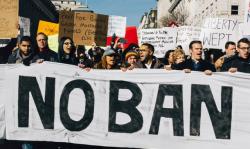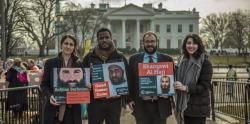We file a FOIA regarding opaque Muslim ban waiver process
[caption align="right"] [/caption]
[/caption]CCR and Muslim Advocates have filed a Freedom of Information Act request (FOIA) demanding documents from federal agencies related to visa denials to dozens of families of U.S. citizens and residents seeking entry to the U.S., stemming from Donald Trump's Muslim ban. The ban supposedly includes a provision for case-by-case waivers for certain individuals who might otherwise be barred from entering under the ban by virtue of their citizenship. The Trump administration has repeatedly pointed to the supposed waiver policy as a defense to challenges to the legality of the ban. However, CCR and Muslim Advocates have received an unprecedented number of reports of mass denials to people who should be eligible for waivers, suggesting that waiver requests are being denied en masse. In particular, many of these denials are for Yemeni families who are fleeing the war in Yemen, and whose cases were transferred to the U.S. consulate in neighboring Djibouti due to the conflict – leaving them stranded there. Moreover, there is no clear information available about how a person may apply for a waiver, how determinations regarding eligibility for a waiver are made and by whom, and whether there is recourse for anyone who is denied a waiver. The waiver denials have kept applicants from reuniting with their families and kept Yemenis fleeing the war in Yemen stranded. We hope the documents demanded in CCR's and Muslim Advocates' FOIA request will shed light on the process for seeking a waiver, as well as whether waivers are being discriminatorily denied.
Amicus briefs support CCR's Gitmo challenge
[caption align="right"] [/caption]
[/caption]Three amicus briefs have been submitted in support of the first major legal challenge to Donald Trump's Guantánamo policy, filed by CCR and co-counsel on January 11, the 16th anniversary of the opening of the prison. A brief filed by Muslim Advocates on behalf of 13 Muslim, faith-based, and civil rights community organizations argues that Trump's blanket refusal to release any prisoners from Guantánamo is based on blatant animus towards Muslims and part of his broader attack on Muslim communities. "Like the series of cases challenging the President's 'Muslim Ban,'" the brief reads, "this case presents a once-rare occurrence: a state actor whose policies are avowedly driven by a discriminatory and punitive ideology." The brief highlights a critical feature of Trump's Guantánamo: while we have always noted that Guantánamo has only ever held Muslim men and boys, Trump is avowedly and intentionally making it a Muslim Prison. A second brief filed on behalf of a group of due process scholars argues that ongoing detention without charge at Guantánamo amounts to unconstitutional preventative detention and that the President "must charge or release Petitioners in order to comply with principles of liberty embodied in the Due Process Clause." Finally, a brief filed by the Center for Victims of Torture (CVT) argues that continued indefinite detention has and will continue to cause physical and psychological trauma, and that these effects are magnified for those men who were tortured in CIA detention and at Guantánamo. "To be sure, Guantánamo is different now than it was in the early to mid-2000s," CVT argues. But for torture survivors in particular, Guantánamo's essence will never change, and as long as the men remain confined there, they will never escape it.
Together, the amicus briefs support CCR's argument that Trump's Guantánamo policy amounts to arbitrary, discriminatory detention, that the dangers of continuing to detain these men indefinitely are grave, and that the courts must intervene.

